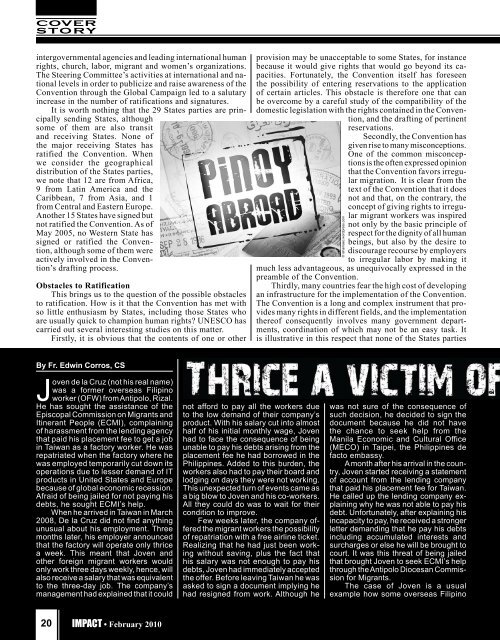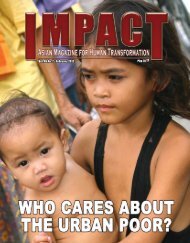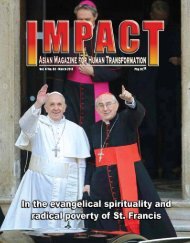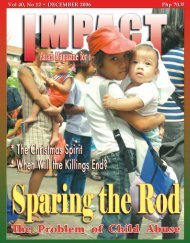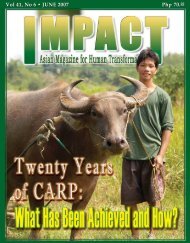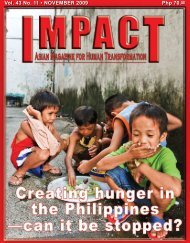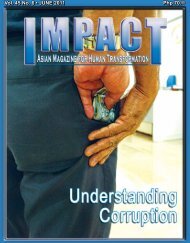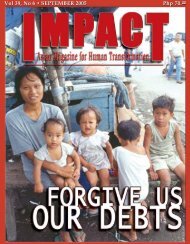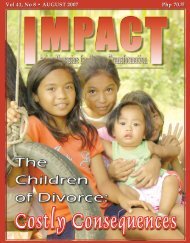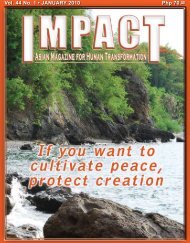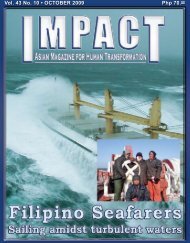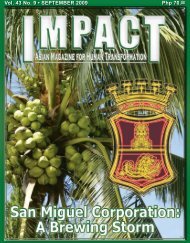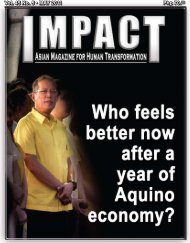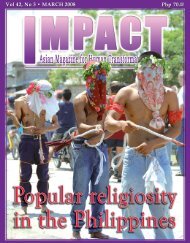Download - IMPACT Magazine Online!
Download - IMPACT Magazine Online!
Download - IMPACT Magazine Online!
Create successful ePaper yourself
Turn your PDF publications into a flip-book with our unique Google optimized e-Paper software.
COVER<br />
STORY<br />
intergovernmental agencies and leading international human<br />
rights, church, labor, migrant and women’s organizations.<br />
The Steering Committee’s activities at international and national<br />
levels in order to publicize and raise awareness of the<br />
Convention through the Global Campaign led to a salutary<br />
increase in the number of ratifications and signatures.<br />
It is worth nothing that the 29 States parties are principally<br />
sending States, although<br />
some of them are also transit<br />
and receiving States. None of<br />
the major receiving States has<br />
ratified the Convention. When<br />
we consider the geographical<br />
distribution of the States parties,<br />
we note that 12 are from Africa,<br />
9 from Latin America and the<br />
Caribbean, 7 from Asia, and 1<br />
from Central and Eastern Europe.<br />
Another 15 States have signed but<br />
not ratified the Convention. As of<br />
May 2005, no Western State has<br />
signed or ratified the Convention,<br />
although some of them were<br />
actively involved in the Convention’s<br />
drafting process.<br />
Obstacles to Ratification<br />
This brings us to the question of the possible obstacles<br />
to ratification. How is it that the Convention has met with<br />
so little enthusiasm by States, including those States who<br />
are usually quick to champion human rights? UNESCO has<br />
carried out several interesting studies on this matter.<br />
Firstly, it is obvious that the contents of one or other<br />
provision may be unacceptable to some States, for instance<br />
because it would give rights that would go beyond its capacities.<br />
Fortunately, the Convention itself has foreseen<br />
the possibility of entering reservations to the application<br />
of certain articles. This obstacle is therefore one that can<br />
be overcome by a careful study of the compatibility of the<br />
domestic legislation with the rights contained in the Convention,<br />
and the drafting of pertinent<br />
reservations.<br />
Secondly, the Convention has<br />
given rise to many misconceptions.<br />
One of the common misconceptions<br />
is the often expressed opinion<br />
that the Convention favors irregular<br />
migration. It is clear from the<br />
text of the Convention that it does<br />
not and that, on the contrary, the<br />
concept of giving rights to irregular<br />
migrant workers was inspired<br />
not only by the basic principle of<br />
respect for the dignity of all human<br />
beings, but also by the desire to<br />
discourage recourse by employers<br />
to irregular labor by making it<br />
much less advantageous, as unequivocally expressed in the<br />
preamble of the Convention.<br />
Thirdly, many countries fear the high cost of developing<br />
an infrastructure for the implementation of the Convention.<br />
The Convention is a long and complex instrument that provides<br />
many rights in different fields, and the implementation<br />
thereof consequently involves many government departments,<br />
coordination of which may not be an easy task. It<br />
is illustrative in this respect that none of the States parties<br />
© ishamaec.wordpress.com<br />
By Fr. Edwin Corros, CS<br />
Joven de la Cruz (not his real name)<br />
was a former overseas Filipino<br />
worker (OFW) from Antipolo, Rizal.<br />
He has sought the assistance of the<br />
Episcopal Commission on Migrants and<br />
Itinerant People (ECMI), complaining<br />
of harassment from the lending agency<br />
that paid his placement fee to get a job<br />
in Taiwan as a factory worker. He was<br />
repatriated when the factory where he<br />
was employed temporarily cut down its<br />
operations due to lesser demand of IT<br />
products in United States and Europe<br />
because of global economic recession.<br />
Afraid of being jailed for not paying his<br />
debts, he sought ECMI’s help.<br />
When he arrived in Taiwan in March<br />
2008, De la Cruz did not find anything<br />
unusual about his employment. Three<br />
months later, his employer announced<br />
that the factory will operate only thrice<br />
a week. This meant that Joven and<br />
other foreign migrant workers would<br />
only work three days weekly, hence, will<br />
also receive a salary that was equivalent<br />
to the three-day job. The company’s<br />
management had explained that it could<br />
not afford to pay all the workers due<br />
to the low demand of their company’s<br />
product. With his salary cut into almost<br />
half of his initial monthly wage, Joven<br />
had to face the consequence of being<br />
unable to pay his debts arising from the<br />
placement fee he had borrowed in the<br />
Philippines. Added to this burden, the<br />
workers also had to pay their board and<br />
lodging on days they were not working.<br />
This unexpected turn of events came as<br />
a big blow to Joven and his co-workers.<br />
All they could do was to wait for their<br />
condition to improve.<br />
Few weeks later, the company offered<br />
the migrant workers the possibility<br />
of repatriation with a free airline ticket.<br />
Realizing that he had just been working<br />
without saving, plus the fact that<br />
his salary was not enough to pay his<br />
debts, Joven had immediately accepted<br />
the offer. Before leaving Taiwan he was<br />
asked to sign a document implying he<br />
had resigned from work. Although he<br />
was not sure of the consequence of<br />
such decision, he decided to sign the<br />
document because he did not have<br />
the chance to seek help from the<br />
Manila Economic and Cultural Office<br />
(MECO) in Taipei, the Philippines de<br />
facto embassy.<br />
A month after his arrival in the country,<br />
Joven started receiving a statement<br />
of account from the lending company<br />
that paid his placement fee for Taiwan.<br />
He called up the lending company explaining<br />
why he was not able to pay his<br />
debt. Unfortunately, after explaining his<br />
incapacity to pay, he received a stronger<br />
letter demanding that he pay his debts<br />
including accumulated interests and<br />
surcharges or else he will be brought to<br />
court. It was this threat of being jailed<br />
that brought Joven to seek ECMI’s help<br />
through the Antipolo Diocesan Commission<br />
for Migrants.<br />
The case of Joven is a usual<br />
example how some overseas Filipino<br />
20<br />
<strong>IMPACT</strong> • February 2010


